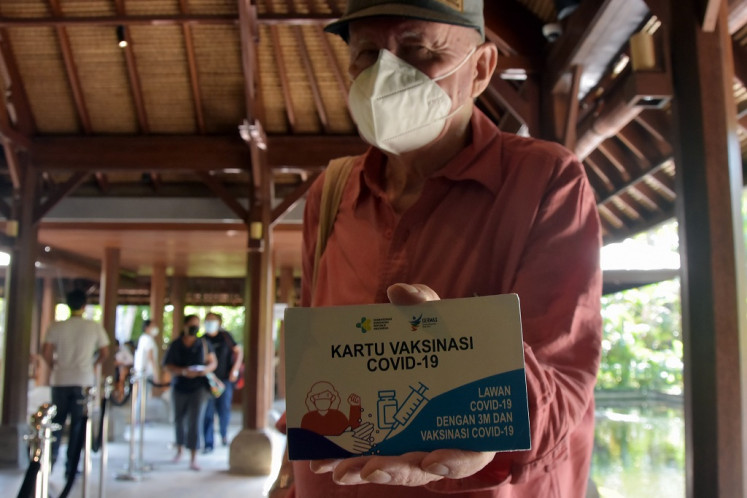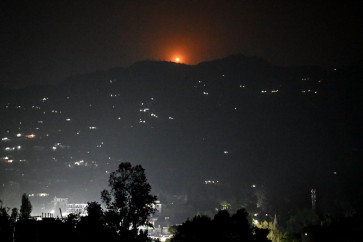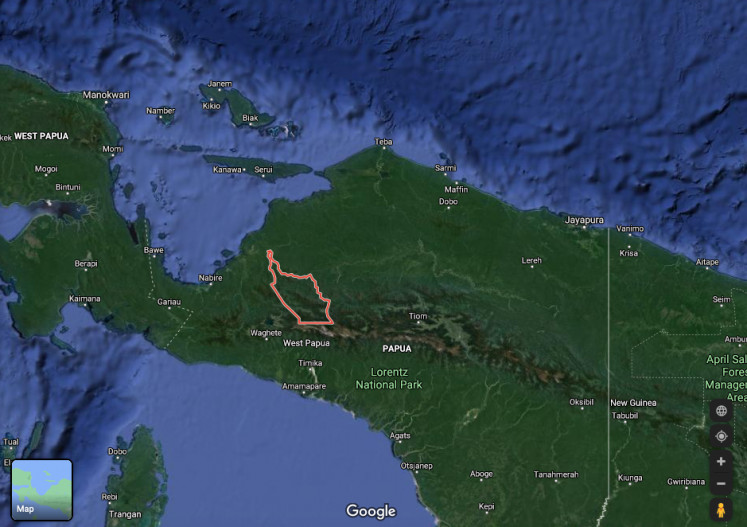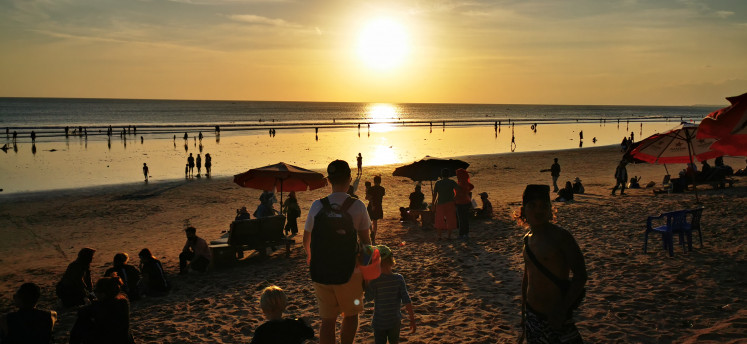Travel rules raise concern over murky vetting norms
Travel remains open despite devastating 'second wave'
Change text size
Gift Premium Articles
to Anyone

T
he government on Tuesday began imposing requirements for international travelers to present proof of COVID-19 vaccination and a negative test result upon their arrival in what is being considered Indonesia’s “vaccine passport” scheme.
The move to buoy the travel industry comes even as regions across Java and Bali impose snap restrictions to alleviate the burden of hospitals overwhelmed by patients in the ongoing “second wave” of infections.
Experts have said, however, that the government’s vetting scheme risks relying on blind faith due to the state’s lack of resources. Meanwhile, uncertainty in the global supply chain for COVID-19 vaccines has exacerbated tensions over the unequal standing among the different vaccine brands.
As more transmissible coronavirus variants spread around the globe amid competing efforts to vaccinate populations, countries have begun introducing measures they believe would guarantee freedom of movement, despite reservations from the World Health Organization (WHO).
The WHO continues to uphold its strong recommendation that strict health protocols be maintained for inoculated travelers.
New travel protocol, new local curbs
Ganip Warsito, the head of the National Disaster Mitigation Agency (BNPB) and the national COVID-19 task force, announced on Sunday that the government protocol for international travel had been updated.
“The addendum to Circular No. 8/2021 is effective on July 6 [and] until a date has been determined,” he said, referring to the previous protocol.
Ganip said that both citizens and foreign nationals planning to travel to Indonesia were required to present a negative result from a reverse transcription-polymerase chain reaction (RT-PCR) test, as well as a printed or digital vaccine certificate.
All international travelers were also required to quarantine for a period of eight days, an increase from the previous policy of just five days. Travelers would be tested for a second time using the RT-PCR method on their seventh day in quarantine.
“In the event that an Indonesian citizen has not been [vaccinated abroad], they will be vaccinated by the end of their quarantine period following arrival, after their second RT-PCR test returns a negative result,” he said at Sunday’s virtual press conference.
Foreign nationals in Indonesia planning to travel either domestically or internationally are required to be vaccinated under the private sector Gotong Royong program. This requirement does not apply to diplomatic travel.
Indonesia imposed the emergency public activity restrictions (PPKM Darurat) from July 3 to July 20 to battle one of the region’s worst epidemics following roughly two weeks of record-breaking daily infections, thought to be driven by the more contagious Delta variant first detected in India.
The PPKM Darurat has caused uncertainty with regard to the government’s many existing COVID-19 policies, including the latest one for international travelers.
Under the emergency restrictions, intercity and interprovincial travelers are required to present vaccine cards to prove that they have received at least one dose of a COVID-19 vaccine. Travelers must also present negative results from a PCR test taken 24 hours prior to departure, or from an antigen test taken 48 hours prior to departure.
Deputy Foreign Minister Mahendra Siregar said on Sunday that the revised protocol for international travel was part of a wider effort to reduce the uncertainty caused by the government’s policy on domestic travel.
“The adjustment to the health protocols for international travel is part of the framework to align [existing policies] with the PPKM Darurat measures and any enforcement of strict or emergency community activity curbs that currently apply in Indonesia until July 20,” said Mahendra.
Jakarta had informed foreign governments and missions in Indonesia of the updated travel protocol through its overseas missions before Tuesday, he added.

Verification conundrum
However, questions remain as to whether any vaccination document issued abroad could be reliably vetted.
Without an adequate database to verify such documentation, the possibility of importing infections could not be dismissed outright, said epidemiologist Dicky Budiman at Australia’s Griffith University.
As for domestic travel, Health Minister Budi Gunadi Sadikin said the government was developing an integrated system for logging vaccination certificates and PCR test results on the ministry’s PeduliLindungi online platform and application.
A ministry spokesperson suggested that foreign-issued vaccine certificates presented by international travelers could also be validated through the electronic Health Alert Card (eHAC) app, which was used for screening international arrivals ahead of an entry ban at the beginning of the year.
It is not clear how this might be possible, however, given the absence of a global standard.
“Will this policy be effective in curtailing imported cases? It becomes tricky to answer because we don’t have an agreed standard,” said M. Habib Dzakwan, a disaster management specialist at the Centre for Strategic and International Studies (CSIS).
The lack of a global standard for validating foreign documents could be “a potentially dangerous” oversight, said Habib, while details on the updated circular were also too few to provide any reassurance.
Meanwhile, Ganip stressed that authorities planned to enforce the updated travel protocol at Soekarno-Hatta International Airport, where special desks were being set up to verify vaccine documents.
State-owned airport operator PT Angkasa Pura II has not responded to The Jakarta Post’s request for comment.
Vaccine passport controversy
Dicky said the government’s updated travel policy inevitably followed the vaccine passports developed in several countries and regions, but which had not yet obtained the WHO’s express approval.
“Indonesia must be ready with its technology. Without it, we would have to run conventional screenings that are solely based on trust,” he noted.
Governments around the world are already negotiating reciprocal acknowledgement of the vaccines each country uses, but the introduction of the so-called vaccine passports has been mired in controversy, with many countries denouncing it as discriminatory.
For example, the European Union recently announced that it would only accept travelers who had been inoculated with vaccines approved by the European Medicines Agency (EMA).
The EMA’s list of approved COVID-19 excludes those manufactured in China and India.
The WHO has voiced its opposition to vaccine passport arrangements, as the probability still exists that vaccines cannot prevent transmission and because “not everyone has access to vaccines and there are groups in society who are excluded”.









